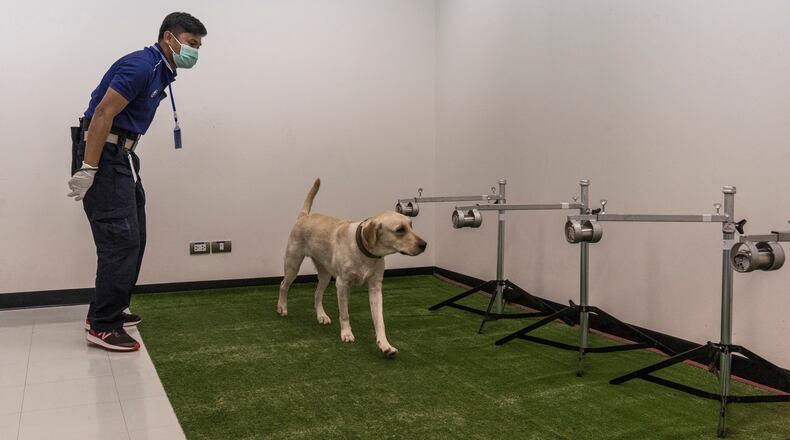BANGKOK — Bobby was a good boy. So was Bravo.
Angel was a good girl, and when she sat, furry hindquarters sliding a little on the tile floor, she raised a paw for emphasis, as if to say, “It’s this cotton ball that my keen nose has identified, the one that smells like COVID-19.”
The three Labradors, operating out of a university clinic in Bangkok, are part of a global corps of dogs being trained to sniff out COVID-19 in people. Preliminary studies, conducted in multiple countries, suggest that their detection rate may surpass that of the rapid antigen testing often used in airports and other public places.
“For dogs, the smell is obvious, just like grilled meat for us,” said Dr. Kaywalee Chatdarong, deputy dean of research and innovation for the faculty of veterinary science at Chulalongkorn University in Bangkok.
The hope is that dogs can be deployed in crowded public spaces, like stadiums or transportation hubs, to identify people carrying the virus.
Credit: contributed
Credit: contributed
Their skills are being developed in Thailand, the United States, France, Britain, Chile, Australia, Belgium and Germany, among other countries. They have patrolled airports in Finland, Lebanon and the United Arab Emirates, and private companies have used them at American sporting events.
Angel, a pale blonde with incipient jowls and a fondness for crunching plastic bottles, is the star of the pack at Chulalongkorn University. But as a group, the dogs being trained in Thailand — Angel, Bobby, Bravo and three others, Apollo, Tiger and Nasa — accurately detected the virus 96.2 percent of the time in controlled settings, according to university researchers. Studies in Germany and the United Arab Emirates had lower but still impressive results.
The Thai Labradors are part of a research project run jointly by Chulalongkorn University and Chevron. The oil company had previously used dogs to test its offshore employees for illegal drug use, and a Thai manager wondered whether the animals could do the same with the coronavirus. A dog’s ability to sniff out COVID-19 is, in theory, no different from its prowess in detecting narcotics, explosives or a Scooby snack hidden in a pocket.
An ‘ideal detector’
The six dogs are assigned six handlers, who exposed them to sweat-stained cotton balls from the socks and armpits of COVID-positive individuals. Researchers say the risks to the dogs are low: The coronavirus is not known to be easily transmissible through perspiration, a plentiful commodity in tropical Thailand. Instead, the main transmission route appears to be respiratory droplets.
On rare occasions, pet cats and dogs in close contact with infected humans have tested positive for the virus, as have populations of minks and other mammals. There are no proven cases, however, of household pets passing the virus to humans.
Within a couple months of training, at about 600 sniffs per day, the Thai dogs were sitting obediently whenever they sensed the cellular byproducts of COVID-19 on cotton balls, which researchers placed at nose height on a carousel-like contraption.
Dogs, whose wet snouts have up to 300 million olfactory receptors compared with roughly six million for humans, can be trained to memorize about 10 smell patterns for a specific compound. Dogs can also smell through another organ nestled between their noses and mouths.
Some research has suggested that dogs of various breeds may be able to detect diabetes, Parkinson’s disease, malaria and certain cancers — that is, the volatile organic compounds or bodily fluids associated with them.
Labradors are among the smartest breeds, said Lertchai Chaumrattanakul, who leads Chevron’s part of the dog project. They are affable, too, making them the ideal doggy detector: engaged and eager.
Questions remain
For a couple hours in the morning and afternoon, the retrievers take turns obligingly pacing up and down a room set up with metal arms that dangle sweat samples. Walking past, they sniff-snuffle up to 10 times a second, as dogs are wont to do. (Humans tend to manage only a single inhalation every second or so.)
Then they retire to their living quarters for a nap and occasional belly rub.
“Their lives are good, better than many humans,” said Thawatchai Promchot, Angel’s handler, who worked as a Chevron supplier before diverting into animal health screening.
The Bangkok-based dogs are now screening sweat samples from Thais who cannot easily reach COVID testing sites, such as the elderly or the bedridden. The dogs’ minders are working to set up a program with the city’s prisons, where thousands of inmates have been diagnosed with COVID.
Cynthia Otto, director of the Penn Vet Working Dog Center at the University of Pennsylvania School of Veterinary Medicine, said that she worries that until there is better research about how good dogs are at sniffing out COVID in real life situations, the method could allow people who are positive to slip by undetected.
“I don’t want to miss those,” she said, “then everyone thinks they’re safe.”
There are still many questions about using dogs to detect the virus.
What do vaccinated people smell like? How easy will it be to train a large pack of COVID-sniffing dogs around the world? What if people being tested by a canine nose aren’t that sweaty? What if a dog gets COVID and loses its sense of smell?
Still, Lertchai said he thought that virus-detecting dogs would be a boon, particularly in countries that don’t have the resources for more expensive testing.
“COVID isn’t going away, and there will be new variants,” he said.
“Dogs want to be helpful, so let’s use them.”
Hannah Beech writes for The New York Times. These stories are part of the Solutions Journalism Network, a nonprofit organization dedicated to rigorous reporting about responses to social problems.
About the Author
Keep Reading
The Latest
Featured



